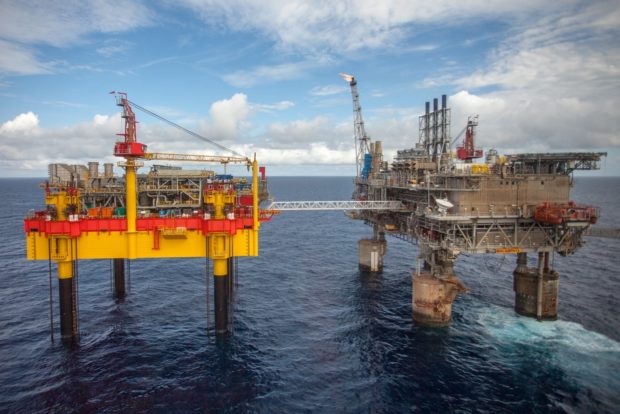
The Malampaya Deep Water Gas-to-Power Project is located 50 kilometers off the coast of Northwest Palawan. It is the only producing natural gas asset in the Philippines. (INQUIRER FILE PHOTO)
MANILA, Philippines — Environmentalists are concerned that the government’s 15-year extension of the Malampaya project contract has the country “locked in” for the long term on fossil gas despite an earlier pledge to shift to renewable energy.
In a statement, Greenpeace senior campaigner Khevin Yu criticized the government for “feigning to be technology agnostic [when] it is obviously biased toward dirty energy.”
“This latest move has locked us in long term to fossil gas — a dirty, dangerous, and costly energy source — shamelessly overturning the President’s promises to prioritize renewable energy,” he said.
Mr. Marcos signed the service contract renewal agreement on Monday, which would allow the continued production and utilization of the remaining reserves of the Malampaya gas field, as well as further exploration and development of its untapped potential.
The gas field, which covers 830 square kilometers, has been supplying natural gas to four power plants — Santa Rita, San Lorenzo, San Gabriel, and Avion — in Batangas province that generate a fifth of the country’s electricity needs.
Its advocates believe that the renewal would offset a potential power crisis caused by the original expiration of the deal in 2024 and the expected depletion by 2027 of the reserves in the field in offshore northwest Palawan.
But for Yu, the extension “was as unrealistic as it is risky.” According to him, “previous studies have already projected the depletion of the gas field as early as next year, and fossil gas also produces emissions that greatly contribute to the worsening climate crisis.”
Moreover, the country’s continued dependence on fossil gas “also exposes us to extreme price volatility of fuel globally,” Yu said.
“With fossil gas already having a huge part in our energy mix—25 percent in the Luzon grid alone—this would mean higher costs for consumers down the road, as international fuel costs are also passed onto local consumers’ electricity bills,” he added.
Yu urged the Marcos administration to stay true to its promise to shift to renewables, which he said was the “only solution” to both the energy and climate crises.
“Instead of chasing after fossil gas projects, our government should hasten a just transition toward renewable energy, which will provide more flexibility to our struggling energy system at much smaller costs,” he said.